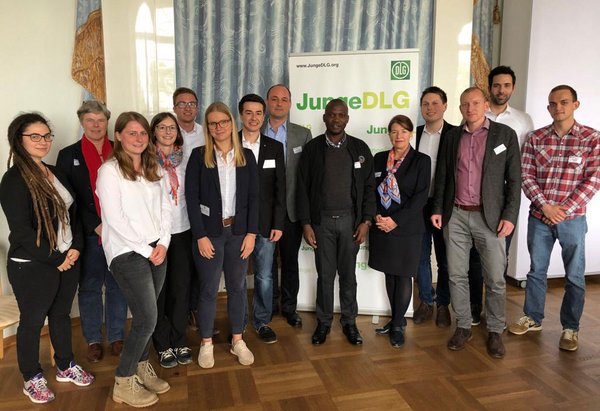- Share this article
- Subscribe to our newsletter
Sustainable agricultural investment in Africa
A large number of students from Southern Germany’s University of Hohenheim as well as guests from outside the university had been invited to this year’s series of presentations organised by “Junges DLG-Team Hohenheim”. Under the heading “Government or Private? Sustainable Investment in African Agricultural Development”, four professional and academic experts discussed possible approaches to sustainable agricultural development on the African continent.
It already became apparent in the welcome address given by Florian Männer, who heads the Junge DLG-Team Hohenheim, that agricultural development is in fact a very wide-reaching field. Professor Ralf Vögele, Dean of the Faculty of Agricultural Science at the University of Hohenheim, stressed the significance of agricultural development in the countries of Africa in his welcome address, adding that the United Nations Sustainable Development Goals could only be achieved with sustainable development in agriculture.
Regina Birner, who holds the Chair of Social and Institutional Change in Agricultural Development at the University of Hohenheim, asked what was more sustainable, investing in smallholders or in large-scale farms, viewing this issue from the angle of science. In her introduction, she presented an overview of the structures in the rural regions of Africa and focused her attention on the high manual labour rate of more than 70 per cent.
The UN Principles for Responsible Agricultural Investments – PRAI
Using examples from research, Birner explained how complex the implementation of the UN Principles for Responsible Agricultural Investments (PRAI) approach was. Many major agricultural investments had foundered on the difficult conditions and unexpected risks, Birner stressed. By contrast, investments in smallholder structures, such as the setting up of an agricultural contractor company, had been significantly more promising.
In her presentation, Birner also noted that the lack of will among the local governments to invest in the agricultural development of their countries was a considerable inhibition, despite the fact that the countries of the African Union had set themselves the goal of investing ten per cent of the budget volume in agricultural development, above all in education and agricultural extension services. Birner deplored the fact that most of the African continent’s countries were still significantly below this rate.
Bearing considerable regional differences in mind
Arne Schuffenhauer of Deutsche Gesellschaft für internationale Zusammenarbeit (GIZ) presented some practical examples from local development cooperation in Hohenheim. As an introduction, he demonstrated with a number of examples that there was not merely “one” Africa in the structures, but that the regions differed considerably from one another.
Taking the area of palm oil plantations, Schuffenhauer illustrated the complexity of such farms depending on the respective region. In addition to work processes ranging from manual ploughing to managing a professionally operated palm oil plantation, there were considerable structural and geographical differences. One elementary factor was electricity supply, which bore a major potential, Schuffenhauer stressed.
In its local activities, in addition to cooperating with governments, GIZ opted for the key aspect of working together with private investors in order to sustainably implement the projects, the expert explained. Schuffenhauer referred to the example of sustainable cocoa cultivation in cooperation with the Fair Trade Company GEPA.
Under the catchword “SMART”, Csaba Lejko of “John Deere Landmaschinen”, Mannheim/Germany, presented the involvement of private industry in sustainable agricultural development in Africa.
In this case, SMART stood for the characteristics of cooperating with the countries of Africa. Starting with the drawing up of solutions for small farmers, Leijko gave an account of the development of special equipment such as no-till sowing machines.
In addition to technical solutions, access to financing with which investments could be made in reliable and long-lasting machinery, provided with spare parts, was a central issue for farmers in the African countries.
The final, but possibly also most important issue was the provision of technology and knowhow, i.e. in addition to the sale of machinery a technology and education service for the operators. Lejko stressed that successful investment always required a secure legal framework, and that local governments had the duty to provide such a framework.
The last speaker the Junge DLG/Team Hohenheim welcomed at the meeting was Denis Kabiito, a farmer from Uganda and Chairman of the Young Farmers Federation of Uganda (UNYFA). As someone immediately affected, Kabiito gave an account of agricultural development in Africa and described the local situation he was experiencing – with all its difficulties such as urbanisation and demographic change.
Around 66 per cent of all workers in Uganda continued to be employed by agriculture, Kabiito stressed, which underscored the considerable importance that this sector had for the country as a whole. He cautioned not to forget that the biggest investors in agriculture were still the farmers themselves. Kabiito therefore called for a regional development of farmers, the founding of sales cooperatives and investing in farmers’ education. Internal investment was the most suitable way to achieve sustainable development.
JungeDLG/Team Hohenheim runs specialist events on topical issues in agriculture and forestry as well as excursions to trade fairs and other specialist meetings several times a year.
Nils Christian, member of Junge DLG/Team Hohenheim





Add a comment
Be the First to Comment